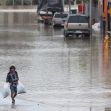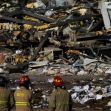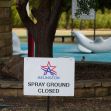Two wrongful death lawsuits filed in Travis County District Court accuse Camp Mystic, a private girls’ summer camp in Kerr County, of negligence and gross negligence in the July 4, 2025, flood that killed 27 people, including 25 campers, two counselors, and the camp’s co-owner. The cases claim that camp leadership ignored repeated flood warnings and failed to evacuate children from low-lying cabins along the Guadalupe River.
Court filings show the lawsuits were filed by families representing 13 victims. They named Camp Mystic LLC, several Eastland family members who owned and operated the camp, and related business entities as defendants. Each family seeks more than one million dollars in damages, alleging that the camp’s policies and decisions contributed to the deaths.
The filings describe a detailed timeline of warnings and responses in the hours before the flood. On July 2, the Texas Division of Emergency Management activated emergency resources in anticipation of flash flooding. The next day, the National Weather Service issued a flood watch for Kerr County. At 1:14 a.m. on July 4, the agency upgraded the alert to a flash-flood warning describing “life-threatening conditions.”
According to the complaints, camp directors Richard “Dick” Eastland and his son, Edward Eastland, received the warning but did not begin evacuations immediately. They allegedly directed staff to secure camp equipment and vehicles before moving campers to higher ground. Between 2:30 and 3:30 a.m., several cabins were evacuated to the recreation hall, but two cabins, known as Bubble Inn and Twins, were told to stay in place.
As floodwaters rose, counselors reportedly used flashlights to signal for help. Richard Eastland’s vehicle was later found submerged downstream with several children inside. His son survived after being swept away while trying to reach the Twins cabins.
Camp Mystic has operated along the Guadalupe River since 1926 and remains one of Texas’s oldest private girls’ camps. The property sits in a region known as “Flash Flood Alley” for its steep terrain and fast-rising rivers. Families say the Eastland family knew of the site’s flood history, citing earlier floods in 1932 and 1978 that damaged cabins and forced evacuations.
The lawsuits point to a written policy instructing counselors and campers to stay in their cabins during floods and stating that “all cabins are constructed on high, safe locations.” Families claim the policy misrepresented the danger and caused confusion that delayed evacuation.
Texas law requires youth camps to keep a written disaster plan with evacuation procedures and to train staff to follow it. The lawsuits state that Camp Mystic’s plan offered little guidance on flooding and that counselors were barred from using cell phones, leaving them without communication once power failed.
Court records describe counselors breaking windows to help campers escape or leading them up nearby hills in the dark. Some reached higher ground, while others were trapped as floodwaters surged through the cabins closest to the river.
The filings also reference the camp’s 2013 request to reclassify certain buildings through a federal process known as a Letter of Map Amendment. The change removed several cabins from the Federal Emergency Management Agency’s 100-year floodplain, allowing the camp to lower insurance costs and avoid stricter construction requirements. Families allege the decision was financially motivated and did not reduce the actual risk.
A separate lawsuit filed by the parents of eight-year-old Ellen Elizabeth Getten adds a claim for intentional infliction of emotional distress. It alleges that after the flood, camp officials sent messages suggesting that children were “unaccounted for” even after learning some had died. Families say the camp began discussing plans to reopen while victims’ bodies were still being recovered.
Camp Mystic has not publicly commented on the litigation. Prominent trial lawyer Mikal Watts, who lives in Kerr County, announced he is representing the camp and the Eastland family pro bono. Watts told the Texas Senate Select Committee on Disaster Preparedness that the tragedy resulted from a failure of regional flood-warning systems, not negligence by camp leadership.
“The facts show this was one of those occasions where no one is to blame,” Watts said in a written statement. He argues that none of the cabins were inside FEMA’s 100-year floodplain and that the July 4 storm produced unprecedented water levels, leaving marks eight feet above the cabin floors. Watts maintains that the Eastlands acted heroically, saying Richard Eastland died while attempting to rescue campers, and Edward Eastland was swept away trying to reach others.
Families dispute that account, asserting that safety failures predated the storm. Their lawsuits describe a pattern of cost-cutting and corporate restructuring that allegedly allowed the Eastlands to shield assets and underinsure the property. They argue that Camp Mystic LLC, Natural Fountains Properties Inc., and Mystic Camps Management LLC operated as a single enterprise and should be held jointly liable.
In addition to compensation for pain, suffering, and funeral costs, the families seek exemplary damages. Texas law defines gross negligence as conduct that poses an extreme risk of harm and shows conscious indifference to the safety of others.
The July 4 flood remains one of the deadliest natural disasters in Texas in recent decades, with one camper still unaccounted for. The lawsuits remain pending in Travis County District Court, and no trial dates have been set.






